Search titles
Displaying results 11 to 20 of 97.

International Review of Environmental History: Volume 9, Issue 1, 2023 »
Edited by: James Beattie
Publication date: July 2023
Inspired by recent scholarship on disaster history and situated within the broader field of environmental history, this special issue highlights structural factors that have exacerbated the effects of extreme weather and explores how states and societies have responded and adapted (or not) during and after disasters. The five case studies all focus on the Indian Ocean World (IOW), a macro-region stretching from eastern Africa to East Asia and Southeast Asia, and align chronologically with the so-called Anthropocene, the period during which the industrial Global North began to leave its indelible imprint on the world’s climatic systems. They build on a small but growing scholarship that looks at historical disasters and disaster responses within the IOW, arguing collectively for the application of historical methodologies in approaching the challenge of extreme weather now and in the future.
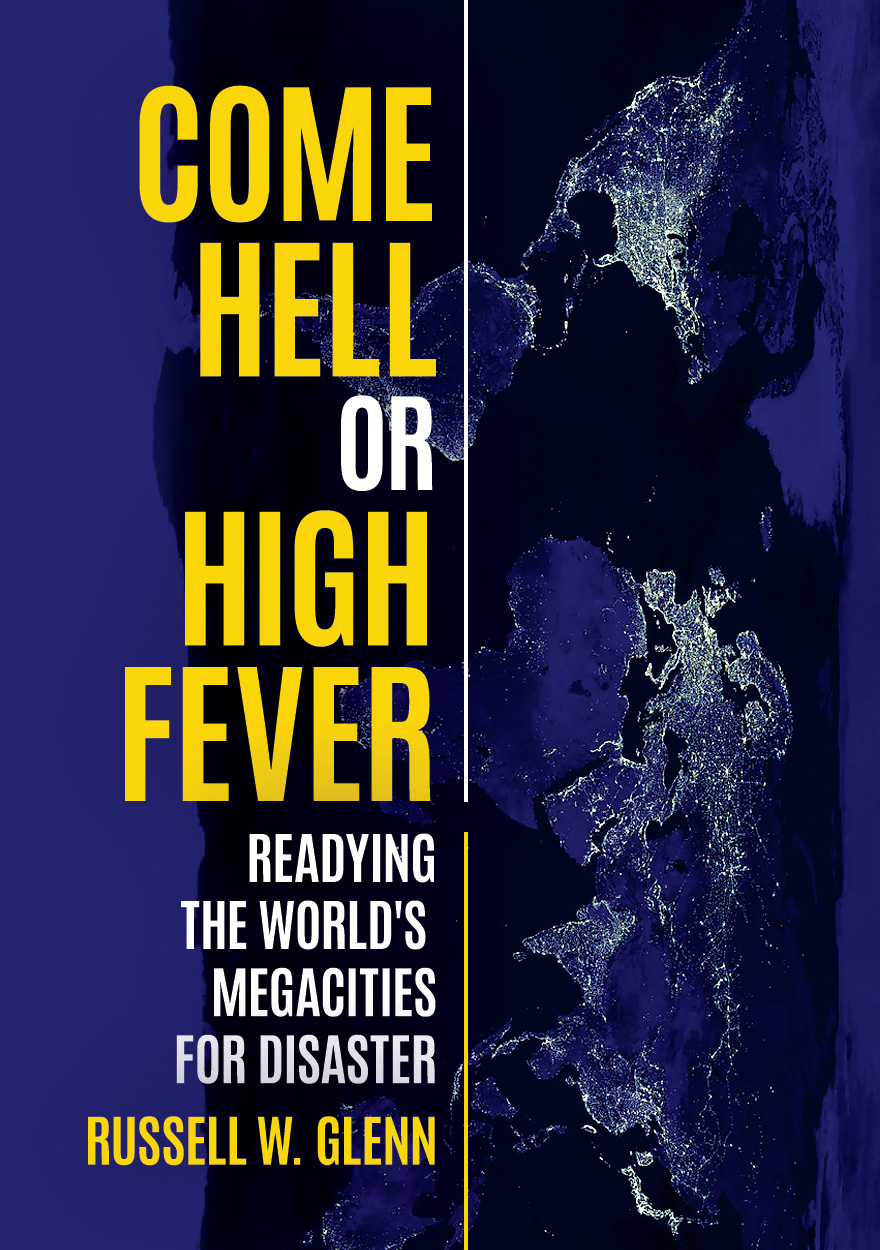
Come Hell or High Fever »
Readying the World's Megacities for Disaster
Authored by: Russell W. Glenn
Publication date: January 2023
‘Nations appear and fall, but cities endure and rediscover how to succeed. In this meticulously defined and researched book, Glenn presents ideas for minimising suffering during urban catastrophes. His urgency identifies risks held in urban areas by 3.5 billion people. These people are many of us: as urban populations occupying 3 per cent of our planet’s land area, drawing water from 41 per cent of the world’s ground surface, consuming 60 to 80 per cent of global energy and achieving 80 per cent of the world’s economic productivity. For Glenn, our resilience—through diversity in preparation, survival and recovery—includes comprehensive approaches that are sustained in duration, orchestrated in bringing all necessary capabilities to bear, layered in approach and early in application.’
—Major General Chris Field, Australian Army
‘The time to prepare for the inevitable is now. Dr Glenn has written a book that should be read by all leaders, planners and responders who may be called upon in an urban disaster, whether natural or man-made. Military leaders should give it particular attention, as the human race is increasingly concentrated in its cities. Understanding how to wage war in dense urban terrain is essential, especially if a nation also seeks to hold the moral high ground. The fruits of any victory won among people that fails to consider the lessons in Come Hell or High Fever are likely to be very bitter.’
—Lieutenant General Sean MacFarland, United States Army (retired)

Marhaba! An Introduction to Modern Standard Arabic »
Publication date: January 2023
Marhaba! An Introduction to Modern Standard Arabic is a unique student handbook specifically written and designed for flexible learning. It consists of 23 lessons that include a variety of online interactive tasks supported by a range of audio resources. Online learners develop reading, listening, speaking and writing skills at the introductory level of Modern Standard Arabic while getting an insight into the culture of the Arab world. This publication addresses the needs of a mobile and diverse cohort of Australian and international students who seek to acquire a basic knowledge of the grammar and syntax of Modern Standard Arabic, a form of the language common to all peoples of the Arab-speaking world, from North Africa to the Middle East and Asia.
Download for free
Not available for purchase
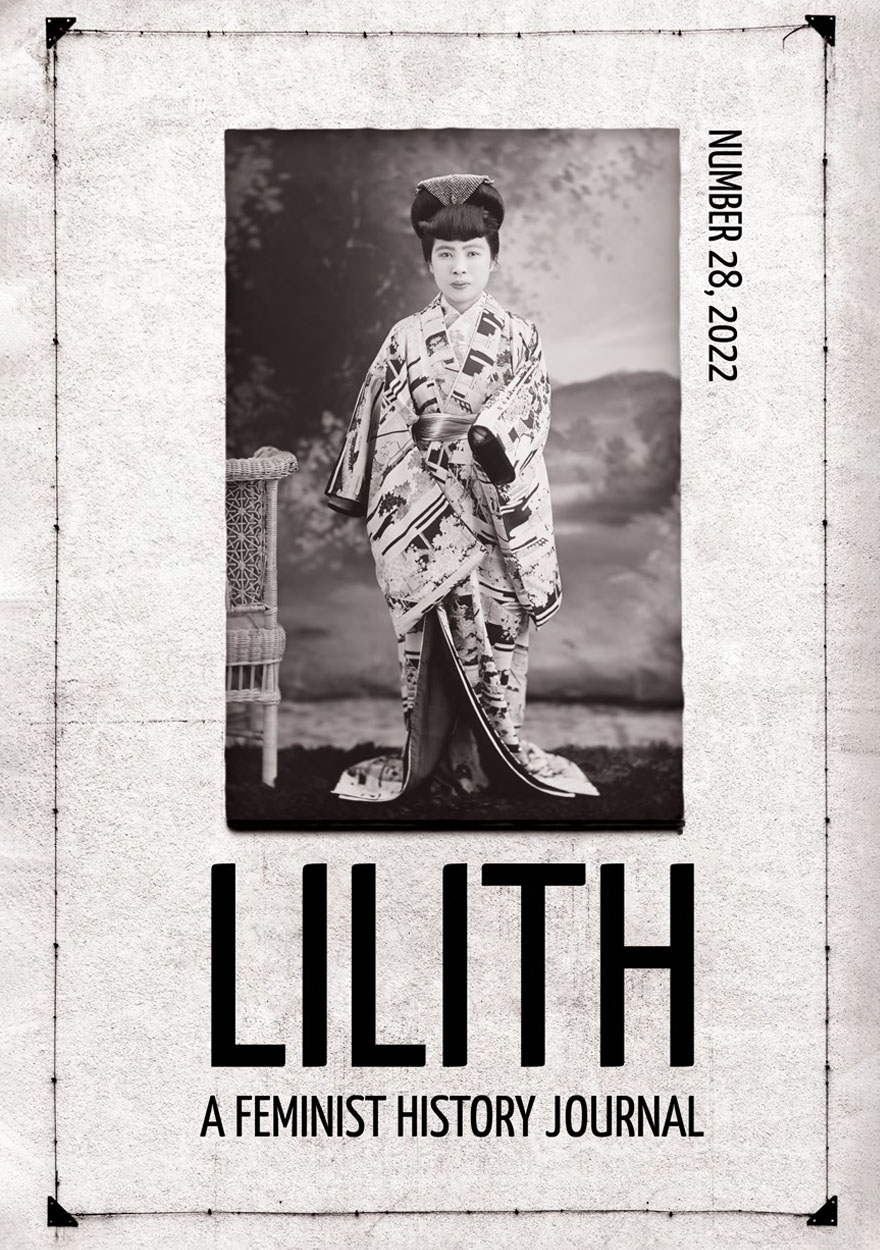
Lilith: A Feminist History Journal: Number 28 »
Publication date: December 2022
New research in this issue of Lilith includes studies of feminist vegetarian activism in Victorian England; the lives of Japanese businesswomen in North Queensland before 1941; negotiations of gender amongst women combatants in Tigray, Ethiopia; and the impacts of the Covid-19 pandemic on women. Each of the four research articles draws upon new sources and interpretations that shed light on the varied experiences of women within and beyond Australia, often challenging established norms or assumptions about progress.
In ‘Vegetarians, Vivisection and Violationism’, Ruby Ekkel explores the centrality of vegetarianism to the activities and lived experience of noted Victorian activist Anna Kingsford. Tianna Killoran’s article ‘Sex, soap and silk’ draws on newly accessible sources in moving beyond traditional narratives that characterise Japanese women in interwar North Queensland as impoverished sex workers. In ‘A Soldier and a Woman’, Francesca Baldwin examines how women combatants in Tigray, Ethiopia, negotiated the connections and collisions between soldiering and womanhood during and after the 1974–91 civil war. Petra Brown and Tamara Kayali Browne’s article ‘Relational Autonomy: Addressing the Vulnerabilities of Women in a Global Pandemic’ explores how the individualistic/atomistic model of autonomy in responses to Covid-19 has disproportionately disadvantaged women.
This issue also contains nine short essay responses from experienced gender scholars—including Ann Curthoys, Sharon Crozier-De Rosa, Catherine Kevin, Ann McGrath, Janet Ramsey, Yves Rees, Madeleine C. Seys, Jordana Silverstein, and Zora Simic—to the question ‘What does it mean to do feminism in 2022?’ These essays reveal the political power of feminist history-making, since, as Ann Curthoys argues in her essay, feminist history is itself a form of activism.
Taken together, these research articles and essays, along with the editorial, demonstrate the fallibility of the notion of history being a narrative of linear progress without relevance to our current reality. They urge against political complacency about the Covid-19 pandemic, colonialism or women's oppression as existing only in the past.
Download for free
Not available for purchase
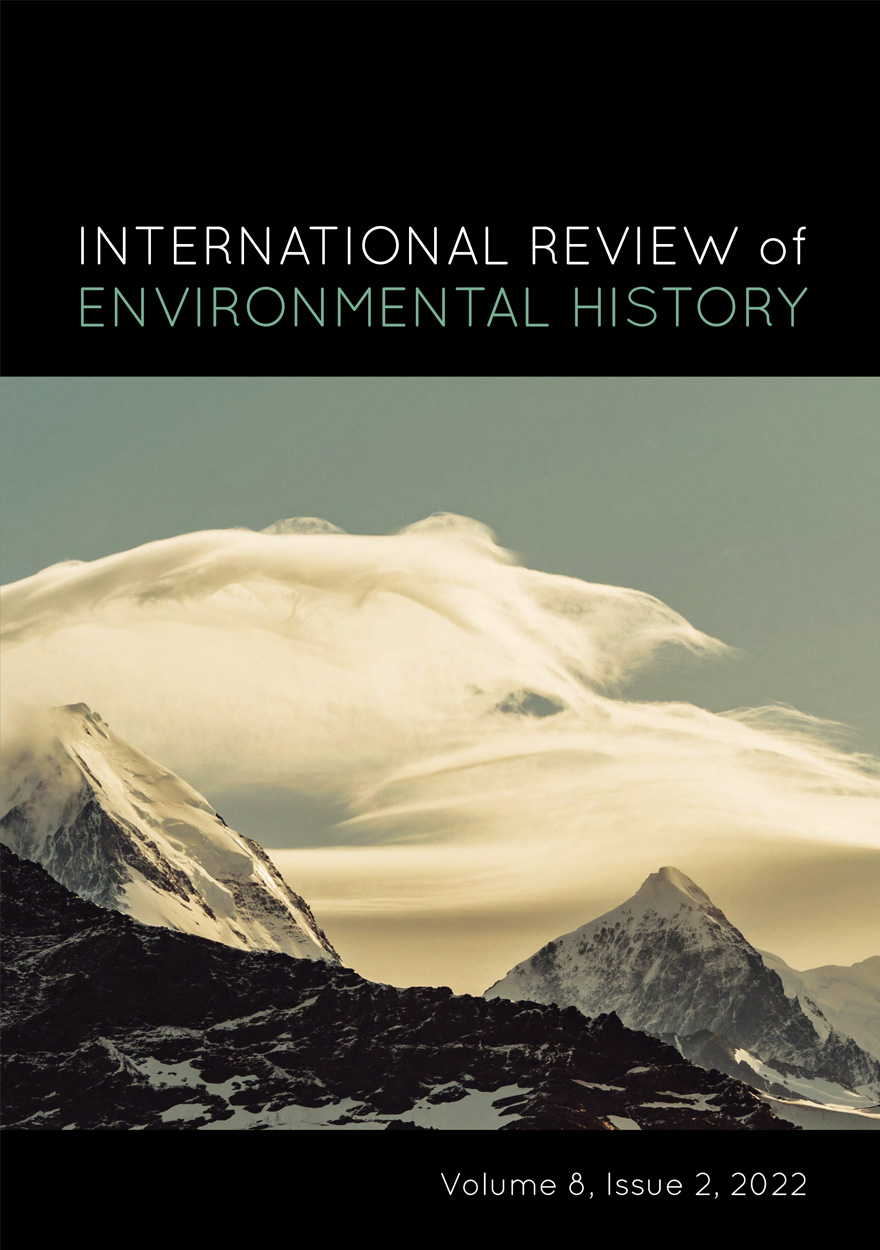
International Review of Environmental History: Volume 8, Issue 2, 2022 »
Edited by: James Beattie, Brett Bennett
Publication date: December 2022
The latest issue of the International Review of Environmental History ranges widely and deeply across several topics, periods and continents. The first part contains six articles, on environmental history teaching; ancient populations and plague; European geographical knowledge of India; environment, architecture and design; introduced ship-borne rats and mice; and environmental change on sub-Antarctic islands.
The second part is a special-issue section, edited by Shoko Mizuno (Komazawa University, Tokyo), on the hybridity of colonial and postcolonial forestry in environmental history. Its articles investigate the production and circulation of knowledge in colonial British, postcolonial and international forestry networks, including during the development of the East Pegu Yoma forestry project in Burma (Myanmar) and the spread of invasive lantana in India.
Download for free
Not available for purchase
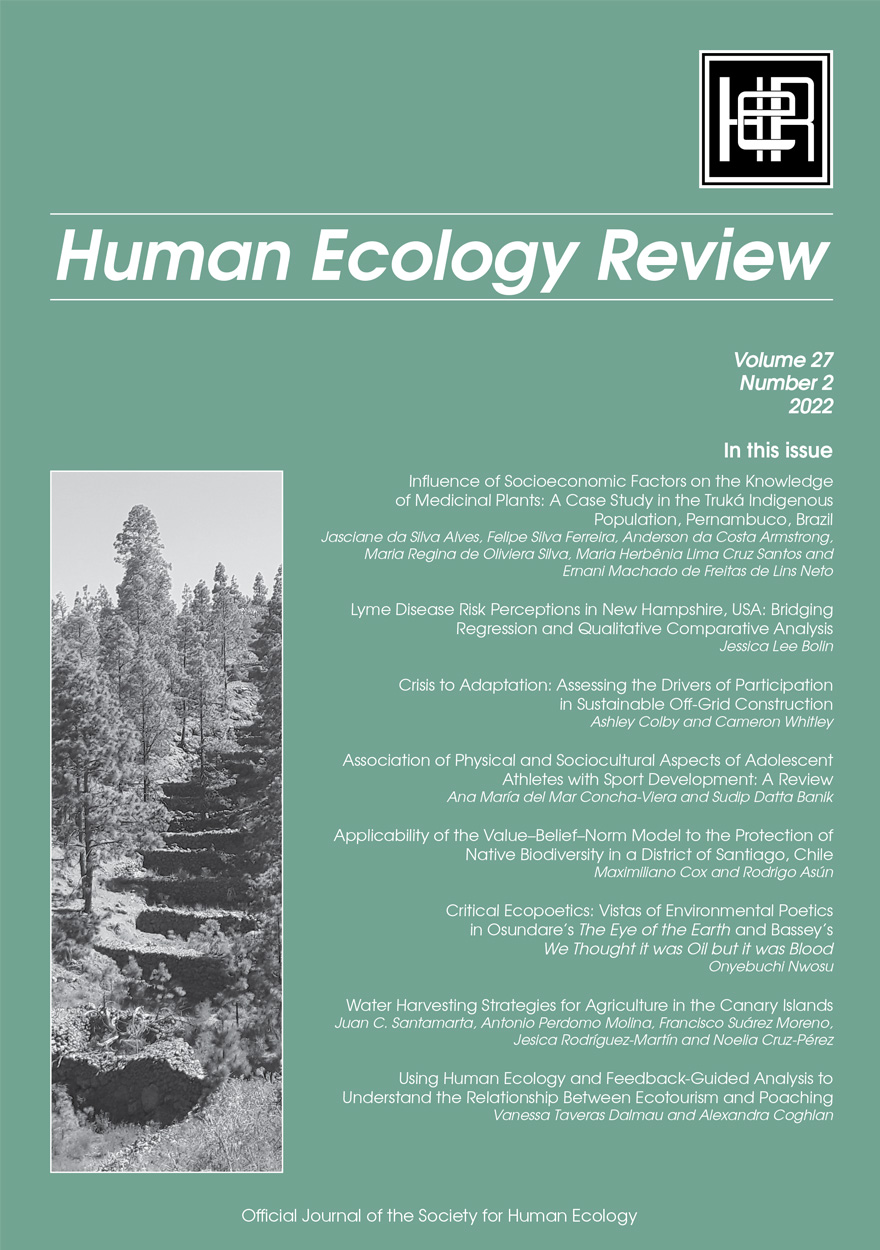
Human Ecology Review: Volume 27, Number 2 »
Publication date: December 2022
Human Ecology Review 27(2) features contributions from researchers from around the world, including Brazil, the United States, Mexico, Chile, Australia, Uruguay, Spain, and Nigeria. Studies presented include the indigenous Truká people’s knowledge of medicinal plants in Pernambuco, Brazil (Alves et al.); perceptions of Lyme disease risk in New Hampshire, USA (Bolin); social and physical aspects of adolescent sport development (Concha-Viera and Datta Banik); the role of ecopolitics and ecopoetics in promoting environmental concerns about and resistance to oil exploration in Africa (Nwosu); traditional water harvesting and conservation in arid regions of the Canary Islands (Santamarta et al.); feedback-guided analysis of ecotourism and poaching in the Dominican Republic (Taveras Dalmau and Coghlan); motivations for participation in off-grid ecovillages, featuring a case study from Uruguay (Colby and Whitley); and biodiversity protection in Santiago, Chile (Cox and Asún).
Download for free
Not available for purchase
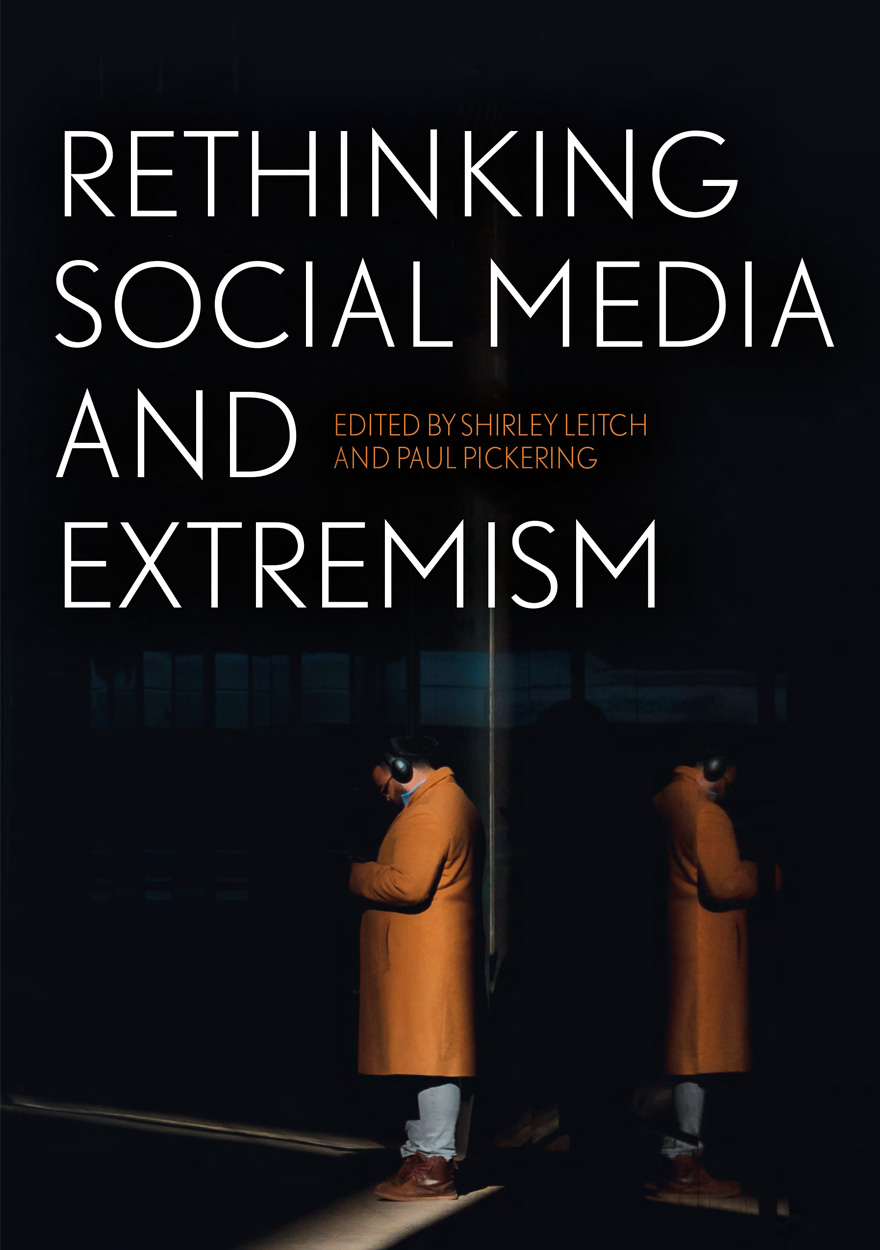
Rethinking Social Media and Extremism »
Edited by: Shirley Leitch, Paul Pickering
Publication date: June 2022
Terrorism, global pandemics, climate change, wars and all the major threats of our age have been targets of online extremism. The same social media occupying the heartland of our social world leaves us vulnerable to cybercrime, electoral fraud and the ‘fake news’ fuelling the rise of far-right violence and hate speech. In the face of widespread calls for action, governments struggle to reform legal and regulatory frameworks designed for an analogue age. And what of our rights as citizens? As politicians and lawyers run to catch up to the future as it disappears over the horizon, who guarantees our right to free speech, to free and fair elections, to play video games, to surf the Net, to believe ‘fake news’?
Rethinking Social Media and Extremism offers a broad range of perspectives on violent extremism online and how to stop it. As one major crisis follows another and a global pandemic accelerates our turn to digital technologies, attending to the issues raised in this book becomes ever more urgent.

Macrocriminology and Freedom »
Authored by: John Braithwaite
Publication date: February 2022
How can power over others be transformed to ‘power with’? It is possible to transform many institutions to build societies with less predation and more freedom. These stretch from families and institutions of gender to the United Nations. Some societies, times and places have crime rates a hundred times higher than others. Some police forces kill at a hundred times the rate of others. Some criminal corporations kill thousands more than others. Micro variables fail to explain these patterns. Prevention principles for that challenge are macrocriminological.
Freedom is conceived in a republican way as non-domination. Tempering domination prevents crime; crime prevention reduces domination. Many believe a high crime rate is a price of freedom. Not Braithwaite. His principles of crime control are to build freedom, temper power, lift people from poverty and reduce all forms of domination. Freedom requires a more just normative order. It requires cascading of peace by social movements for non-violence and non-domination. Periods of war, domination and anomie cascade with long lags to elevated crime, violence, inter-generational self-violence and ecocide. Cybercrime today poses risks of anomic nuclear wars.
Braithwaite’s proposals refine some of criminology’s central theories and sharpen their relevance to all varieties of freedom. They can be reduced to one sentence. Strengthen freedom to prevent crime, prevent crime to strengthen freedom.
‘A true magnum opus, Macrocriminology and Freedom is a thought provoking and generative book from one of criminology’s intellectual giants. John Braithwaite reaches far and wide across societies, time, and disciplines to advance no less than a theory of how to build a society that simultaneously reduces both domination and crime. His ambitious ideas on cascades of non-dominating collective efficacy and crime prevention, for example, and their connections to social movements and political freedom, go well beyond usual criminological discourse. Chock full of theoretical propositions and bold insights, this a book that will keep criminologists busy for years. Macrocriminology and Freedom should not just be read, but better yet, savoured.’
– Robert J. Sampson, Henry Ford II Professor of the Social Sciences, Harvard University
‘In this majestic theorisation of the relationship between crime and freedom John Braithwaite isolates the unique power of macrocriminology as a lens through which to comprehend and challenge many of the fundamental crises facing our planet. Very few scholars have the breadth and overview to succeed in a mission of this order … Braithwaite does. This extraordinary book is an object lesson for all who seek to understand and resist domination and the crimes of power that flow from it.’
– Penny Green, Professor of Law and Globalisation, Queen Mary University of London
‘For over 40 years, John Braithwaite has been a voice of wisdom, hope and humanity in criminology. This dazzling new book weaves together all the main themes of his influential work, reanimating many of the core concepts of the discipline, as well as incorporating interdisciplinary resources from south and north, east and west, to produce an elegant and ambitious explanatory and normative account of crime as freedom-threatening domination. Decentring criminal justice as the solution to crime, Braithwaite shows that, on a global scale, the aspiration to tackle crimes, ranging from interpersonal violence through corporate crimes to ecocide, lies in the development of freedom-enhancing, power-tempering institutions in the political, economic and social spheres.’
– Nicola Lacey, Professor of Law, Gender and Social Policy, London School of Economics
‘Macrocriminology and Freedom is a criminological epic, an expansive and erudite story that sweeps across history and contexts. The book is frightening in showing how cascading events can produce catastrophes from crime to environmental destruction. But in the end, its message is hopeful, identifying pathways—or “normative rivers”—for guiding freedom from domination and crime. Drawing on his distinguished career, John Braithwaite has bestowed an extraordinary gift—a book, like other masterpieces, that will yield special insights each time we take an excursion through its pages.’
– Francis T. Cullen, Distinguished Research Professor Emeritus, University of Cincinnati
‘In this engaging book John Braithwaite reinvigorates discussions about crime and its control. While advocating a macro approach, the book is punctuated not only with insights and data from smaller-scale studies conducted in a range of jurisdictions, but also with auto-biographical vignettes. The effect creates a deeply personal account of the perils of state, non-state and market violence and authoritarianism and the potential and indeed duty, of criminologists to work towards their reduction, by refocusing their efforts on explaining and tackling crime in its myriad of forms.’
– Mary Bosworth, Professor of Criminology, University of Oxford and Monash University
‘John Braithwaite has had a unique influence on criminology globally. In this encyclopaedic text he synthesises a wealth of criminological knowledge, particularly in the sphere of anomie theory, into broader debates about the nature of domination and freedom in contemporary society. He defends the relevance of criminological theory, while urging criminology to be activist rather than reactive and technocratic, counter-hegemonic rather than neutral. Not for the first time, John Braithwaite has challenged criminologists to construct theories that cut across micro and macro structures. This book will stir debate. It deserves a broad readership.’
– Harry Blagg, Professor of Criminology, University of Western Australia
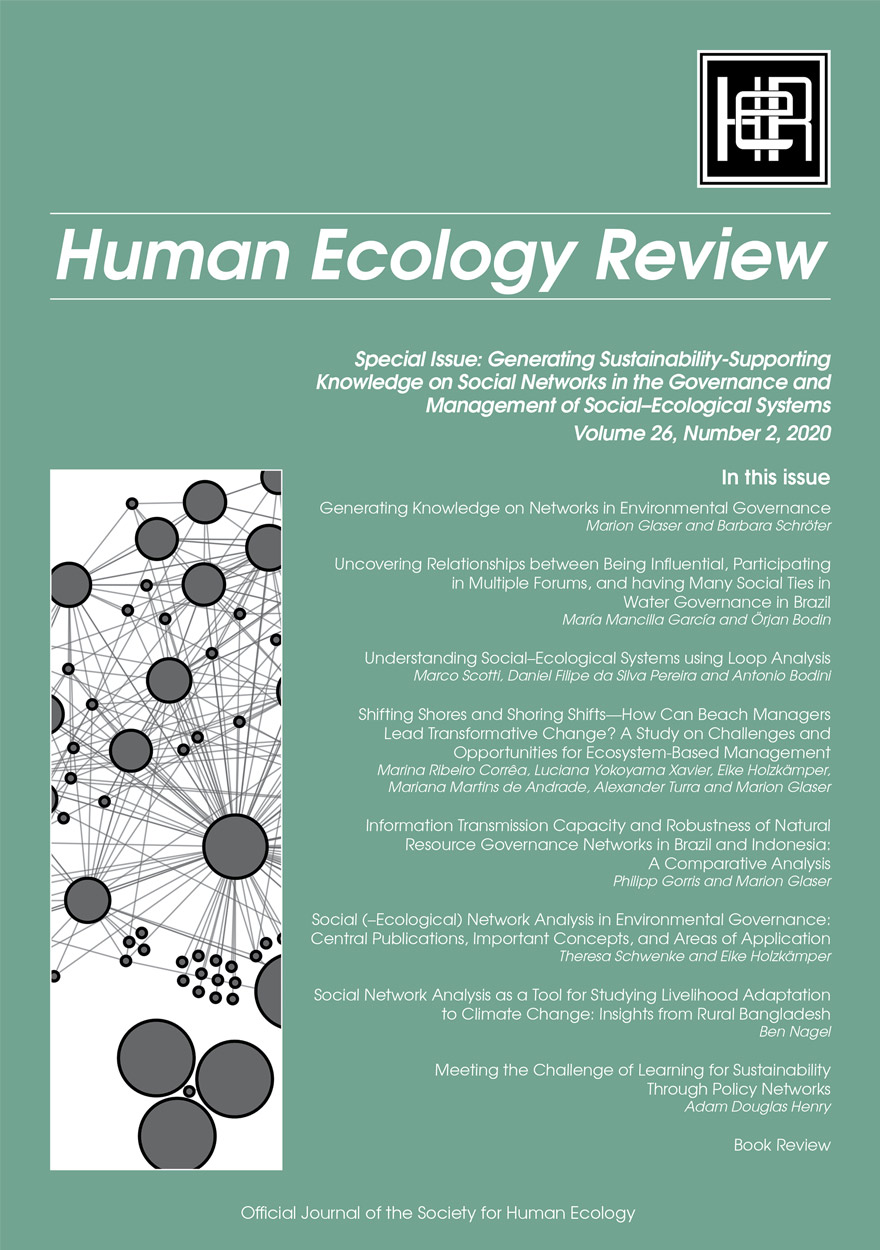
Human Ecology Review: Volume 26, Number 2 »
Publication date: July 2021
This volume is a special issue on ‘Generating Sustainability-Supporting Knowledge on Social Networks in the Governance and Management of Social–Ecological Systems’, compiled by guest editors Marion Glaser and Barbara Schröter. The collection of papers demonstrates the capacity of social network analysis to contribute to understanding the interactions of actors and institutions. María García and Örjan Bodin set out to differentiate to what extent power resides within network structures and whether it is rooted in actor attributes such as class and wealth. Marco Scotti, Daniel Pereira, and Antonio Bodini present loop analysis as a qualitative tool for linking disciplinary domains in integrated analyses of the natural and social science variables. Marina Corrêa and her co-authors examine the role and potential of public sector managers for advancing the ecosystem service-oriented management of the social–ecological systems. Philipp Gorris and Marion Glaser focus on the information transmission capacity and the robustness of actor networks in different approaches to collaborative governance of coastal and marine natural resources. Theresa Schwenke and Eike Holzkämper present a bibliometric analysis of publications that address both environmental governance and social (–ecological) network analysis. Ben Nagel presents a coastal case study from Bangladesh, one of the countries most vulnerable to climate change. The collection is rounded out by Adam Henry, who focuses on sustainability learning at the organisational level, addressing to what extent an organisation’s position in a larger environmental policy network determines learning outcomes.
Download for free
Not available for purchase
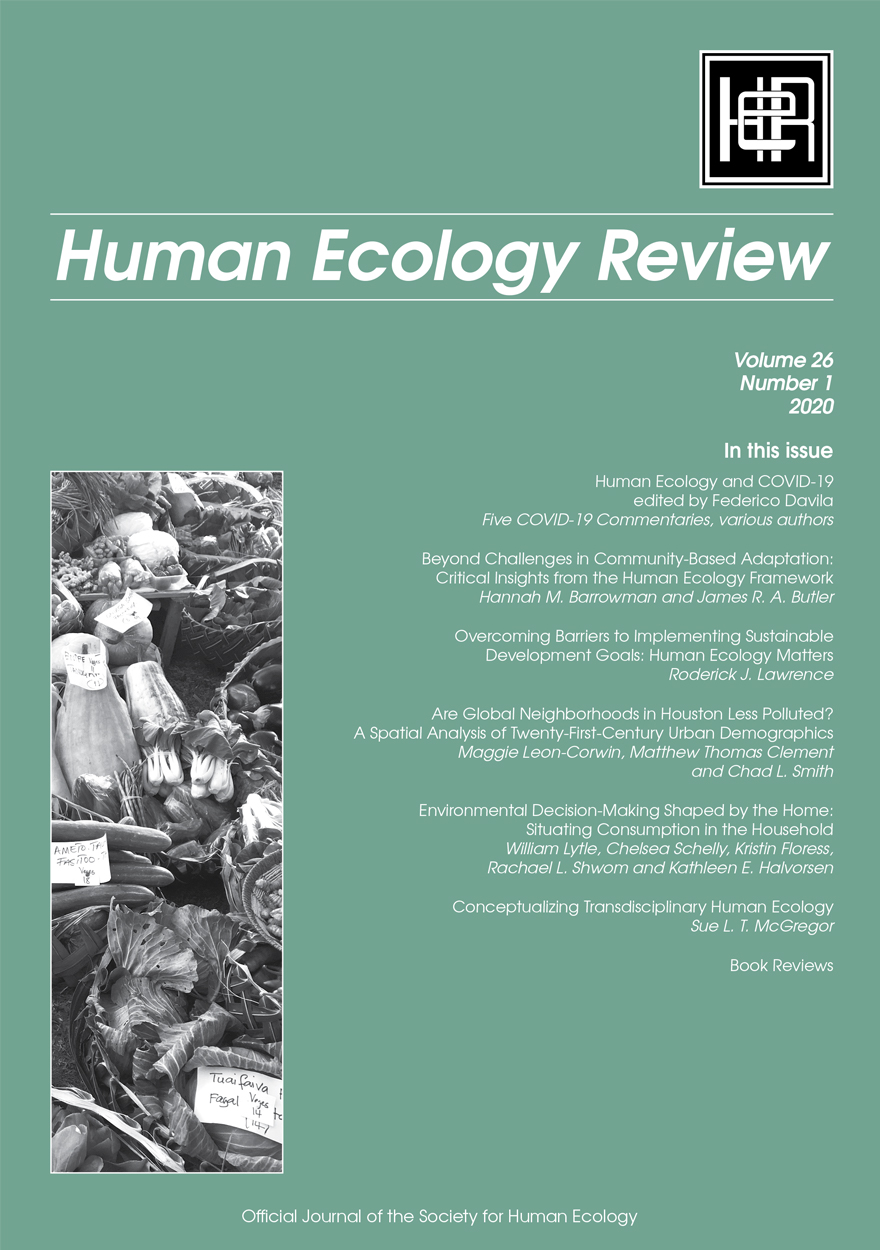
Human Ecology Review: Volume 26, Number 1 »
Publication date: April 2021
Human Ecology Review is a semi-annual journal that publishes peer-reviewed interdisciplinary research on all aspects of human–environment interactions (Research in Human Ecology). The journal also publishes essays, discussion papers, dialogue, and commentary on special topics relevant to human ecology (Human Ecology Forum), book reviews (Contemporary Human Ecology), and letters, announcements, and other items of interest (Human Ecology Bulletin). Human Ecology Review also publishes an occasional paper series in the Philosophy of Human Ecology and Social–Environmental Sustainability.
Download for free
Not available for purchase



